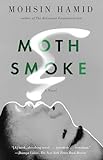 Mohsin Hamid’s new novel How To Get Filthy Rich in Rising Asia is loosely structured as a self-help book. Although, as the writer notes at the outset, “the idea of self in the land of self-help is a slippery one.” Self-help books, he writes, “are an oxymoron. You read a self-help book so someone who isn’t yourself can help you, that someone being the author.” The book follows the trajectory of a self-made man somewhere in “rising Asia,” from very poor small boy in the provinces to extremely rich old man in an unnamed metropolis.
Mohsin Hamid’s new novel How To Get Filthy Rich in Rising Asia is loosely structured as a self-help book. Although, as the writer notes at the outset, “the idea of self in the land of self-help is a slippery one.” Self-help books, he writes, “are an oxymoron. You read a self-help book so someone who isn’t yourself can help you, that someone being the author.” The book follows the trajectory of a self-made man somewhere in “rising Asia,” from very poor small boy in the provinces to extremely rich old man in an unnamed metropolis.
Chapter headings include Get an Education, Don’t Fall in Love, Avoid Idealists, Befriend a Bureaucrat, Be Prepared To Use Violence. Each chapter begins with a few words on these themes, often interesting and insightful — “No self-help book can be complete,” Hamid writes, at the outset of Befriend a Bureaucrat,
without taking into our account our relationship with the state. For if there were a cosmic list of things that unite us, reader and writer, visible as it scrolled up and into the distance, like the introduction to some epic science-fiction film, then shining brightly on that list would be the fact that we exist in a financial universe that is subject to massive gravitational pulls from states.
 The opening remarks complete, Hamid dives into the specifics of the man’s story. Hamid’s characters, country, and city are unnamed in this book. The writing is often beautiful, and Hamid’s political commentary remains razor-sharp. In his brilliant previous novel, Moth Smoke, he addressed the problem of economic inequality head-on, and he doesn’t shy away from it here. His protagonist’s path to filthy richness involves selling drinking water. A prospective client pitches him on a planned development where residents will actually be able to drink the water that comes out of the tap: it’ll be “[l]ike you’ve gone to Europe,” he says. “Or North America.”
The opening remarks complete, Hamid dives into the specifics of the man’s story. Hamid’s characters, country, and city are unnamed in this book. The writing is often beautiful, and Hamid’s political commentary remains razor-sharp. In his brilliant previous novel, Moth Smoke, he addressed the problem of economic inequality head-on, and he doesn’t shy away from it here. His protagonist’s path to filthy richness involves selling drinking water. A prospective client pitches him on a planned development where residents will actually be able to drink the water that comes out of the tap: it’ll be “[l]ike you’ve gone to Europe,” he says. “Or North America.”
“Without leaving home,” your brother-in-law says.
“Exactly. Without leaving home. You’ll still be here. But in a secure, walled-off, impeccably maintained, lit-up-at-night, noise-controlled, perfectly regulated version of here.”
But where is here, exactly, in a book without names? Based on Hamid’s previous work, my best guess is Pakistan. There’s a certain tension here between the general and the specific: my suspicion is that getting filthy rich in rising Pakistan is probably a somewhat different experience than, say, getting filthy rich in rising China. It’s not at all clear to me that the story is well-served by Hamid’s vagueness.
The protagonist is rendered in the second person, which proves an elegant method of sidestepping the fact that he doesn’t have a name, and also has the interesting effect of turning him into a sort of avatar for the reader. The reader is addressed as “you” in the opening remarks of each chapter, and then a more specific you, the man who was born in the provinces and has come to the unnamed metropolis to make his fortune, sets out in his car and drives to the office, or takes a meeting with a bureaucrat, or sits down to dinner with his son. He is distracted now and then by thoughts of his lifelong object of desire, a woman referred to throughout only as “the pretty girl.”
But this is a book that follows its characters over the course of their lives, so while referring to her as “the pretty girl” works well enough when she’s a scrappy teenager in a rough neighborhood, the moniker becomes a little jarring by the time “the pretty girl” is a successful businesswoman in middle age. As the book progresses, the structure to which Hamid has committed himself begins to seem increasingly cumbersome.
The problem, of course, is that while the self-help format is somewhat general by nature, novels tend to be stories about specific people, specific situations and lives, and Hamid’s latest is no exception. He might be addressing a general “you” at the beginning of each chapter, but he’s still writing about a particular life, with its particular triumphs, sorrows, and complications.
That life is often beautifully rendered, because Hamid is one of the best writers working today. If Hamid has committed himself to a structure that works to the book’s detriment, that detriment isn’t fatal. How To Get Filthy Rich in Rising Asia is filled with flashes of brilliance, deeply moving passages, and the beautifully clear prose style that I’ve admired so greatly in Hamid’s previous works.








